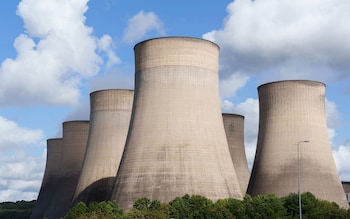Ed Miliband’s bid to move the UK on to green energy risks destabilising the National Grid, a leading EDF executive has warned.
Rachael Glaving said that by abandoning stable forms of energy generation, such as coal, gas and nuclear, the grid would be reliant on intermittent sources such as wind and solar.
She indicated that this would leave the UK’s energy system at risk of a shortfall should the weather fail to deliver.
Mr Miliband’s bid to shift away from fossil fuels is integral to his goal of decarbonising Britain’s power system by 2030.
To achieve this, he launched the National Energy System Operator (NESO), a new quango tasked with operating the UK’s high-voltage transmission networks.
It comes after the final shutdown of Ratcliffe-on-Soar, the UK’s last coal-fired power station, as well as the looming closure of eight of EDF’s nuclear reactors within the next four years.

Ms Glaving, who is responsible for EDF’s nuclear fleet, said that these reactors were crucial to providing the steady baseload power essential for grid stability.
Speaking at the Conservative Party Conference, she said: “A key issue for NESO is to make the grid as stable as possible, and as we lose nuclear, that stability is what we will lose.
“We will lose our strong foundation of baseload generation, which helps support renewables, and which has made it possible to add so much wind and solar.
“Our ability to have even more renewables in the UK has been because of this strong [nuclear] foundation.
“So if you start eroding the foundation then we have to start leaning on other things to support renewables. Perhaps we’ll import more power from Europe and we will see the impacts on our bills. We’ll [also[ see it in grid stability.”
Meeting such challenges will be key to the success of NESO, which will have strategic independent oversight of both the electricity and gas systems.
One of NESO’s first actions will be to deliver guidance to the Government on the delivery of a clean power system by 2030. NESO chief executive Fintan Slye is expected to deliver a report to Mr Miliband on how best to achieve this within weeks.
Another key challenge for NESO and Mr Slye is to cut energy bills. The UK has some of the world’s highest bills, with domestic electricity in the UK costing twice what consumers pay in the US.
Energy minister Michael Shanks has said that fossil fuels were a key factor in surging energy prices, claiming that energy bills will fall as we move increasingly to green energy.
However, the impending closure of EDF’s eight nuclear reactors could pose a growing problem.
It will leave the UK with just one operating reactor, the Sizewell C station in Suffolk, until EDF brings Hinkley Point C into operation next decade.
Disclaimer: The copyright of this article belongs to the original author. Reposting this article is solely for the purpose of information dissemination and does not constitute any investment advice. If there is any infringement, please contact us immediately. We will make corrections or deletions as necessary. Thank you.



